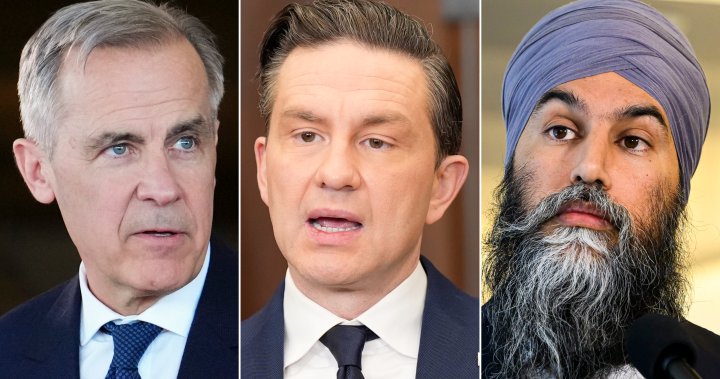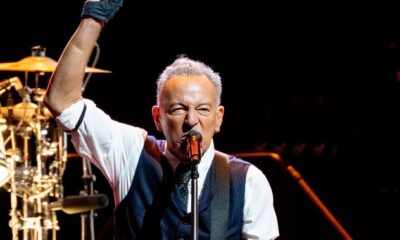Breaking News
In federal leaders’ debates, these are the topics set to dominate – National

Canada’s relationship with the United States and President Donald Trump will likely dominate this week’s leaders’ debates for the federal election, but experts say there will be other issues to watch for.
The leaders of the Liberals, Conservatives, New Democrats and Bloc Québécois will gather in Montreal Wednesday evening for the campaign’s only French-language debate, followed by the English-language debate on Thursday.
The federal debate commission rescinded an invitation to the Green Party, saying that “the Commission concludes that because the Green Party of Canada has intentionally reduced the number of candidates running in the election for strategic reasons, it no longer meets the intention of the participation criteria to justify inclusion in the leaders’ debates.”
You can find details on how to watch both debates here, as well as a breakdown of each party’s campaign promises on key issues so far here.

The latest Ipsos poll conducted exclusively for Global News and released Sunday suggests 43 per cent of Canadians plan to watch at least one of the debates, while just 21 per cent said they will not watch.
That same poll, which found the Liberals leading but the Conservatives gaining ground, suggested 11 per cent of voters remain undecided.
“I suspect there will be a number of undecided voters tuning in to see how they will respond to some of these hard questions,” said Mary Anne Carter, a federal lobbyist and principal of government relations at Earnscliffe Strategies.
Here’s what to look out for on both nights.
The campaign has been dominated by Trump’s ever-evolving trade policies and the impacts his tariffs are having on Canadian workers and consumers, as well as threats to Canada’s sovereignty.
Which leader will best stand up to Trump and protect Canada from those threats has become “the ballot question” of the election, Carter said, and will inform much of what’s discussed in the debates.
“It’s hard to recall the last time the country has had such a high-stakes debate,” said Stewart Prest, a lecturer in the political science department at the University of British Columbia.

Although Ipsos found Canadians see U.S. relations as less of an issue compared with two weeks ago, its latest polling also suggests the Liberals are overwhelmingly seen as the party best equipped to handle Trump and the U.S.

Get daily National news
Get the day’s top news, political, economic, and current affairs headlines, delivered to your inbox once a day.
That presents pitfalls for both Liberal Leader Mark Carney and Conservative Leader Pierre Poilievre, Prest said.
“The risk, or the dilemma, for Poilievre is to find ways to stand up for those issues that he thinks are important and that resonate for his populist supporters, but every time he does so in ways that sound a little bit Trumpian, he risks alienating the rest of the country,” he said.
“For Carney, I think the risk is the reverse, where he is going to be at risk of looking like a target of populist outrage if he’s not careful in how he conducts himself…. To effectively address the challenges Canadians are facing, he must clearly communicate his understanding through both his policies and actions. The focus on affordability and other key issues in the upcoming election is evident in recent polling data. The Conservatives are seen as best equipped to tackle affordability, while the Liberals lead on the economy as a whole. With energy, climate, foreign affairs, and national security also on the agenda, the candidates must navigate these topics carefully. Language skills, particularly in French, may play a significant role in shaping voter perceptions. Despite the dominance of the Liberals and Conservatives in this election, the NDP, Bloc Québécois, and Greens are still vying for attention. While the impact of debates on voter decisions remains uncertain, a strong performance could sway some undecided voters. Ultimately, all party leaders must strive to make a lasting impression to secure support. Please rewrite this sentence for me.
-

 Destination8 months ago
Destination8 months agoSingapore Airlines CEO set to join board of Air India, BA News, BA
-

 Breaking News10 months ago
Breaking News10 months agoCroatia to reintroduce compulsory military draft as regional tensions soar
-

 Tech News12 months ago
Tech News12 months agoBangladeshi police agents accused of selling citizens’ personal information on Telegram
-

 Gadgets3 months ago
Gadgets3 months agoSupernatural Season 16 Revival News, Cast, Plot and Release Date
-

 Productivity11 months ago
Productivity11 months agoHow Your Contact Center Can Become A Customer Engagement Center
-

 Gadgets3 weeks ago
Gadgets3 weeks agoFallout Season 2 Potential Release Date, Cast, Plot and News
-

 Breaking News10 months ago
Breaking News10 months agoBangladesh crisis: Refaat Ahmed sworn in as Bangladesh’s new chief justice
-

 Toys12 months ago
Toys12 months ago15 of the Best Trike & Tricycles Mums Recommend























